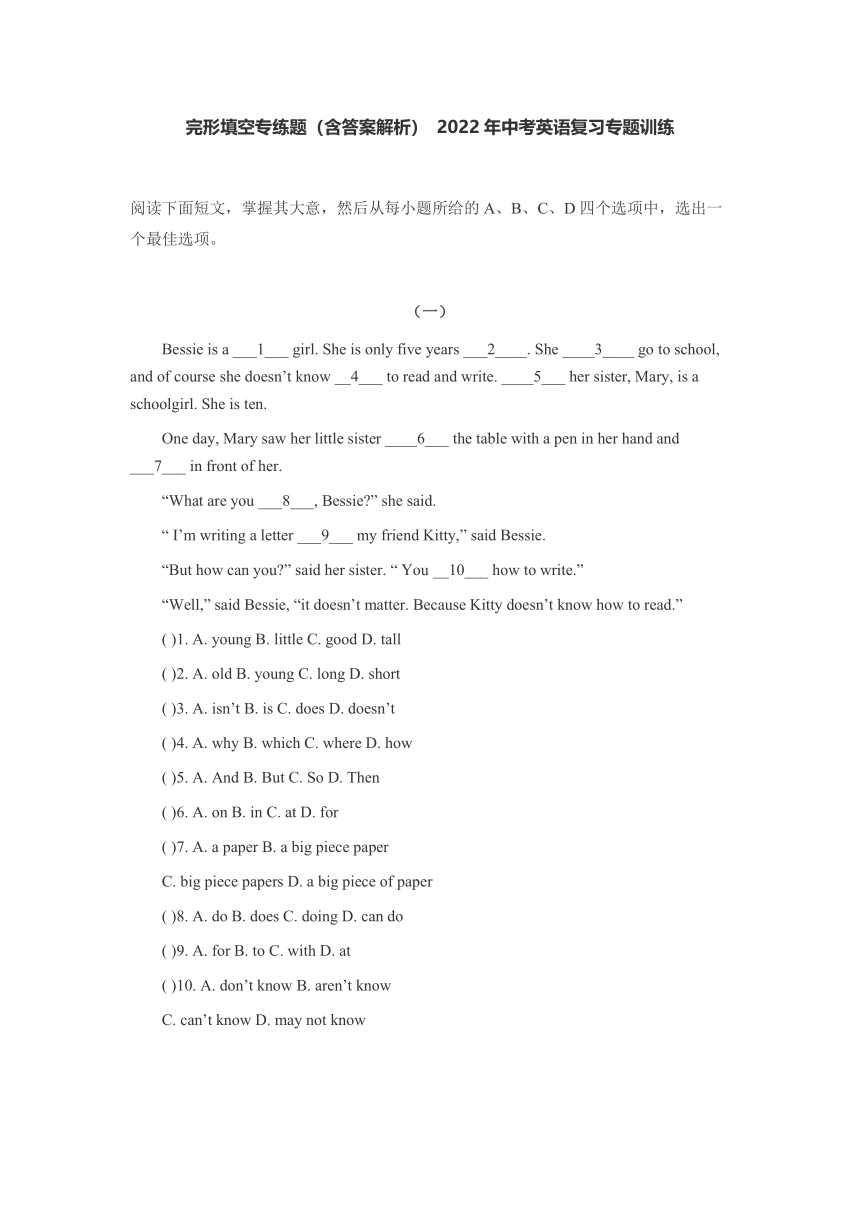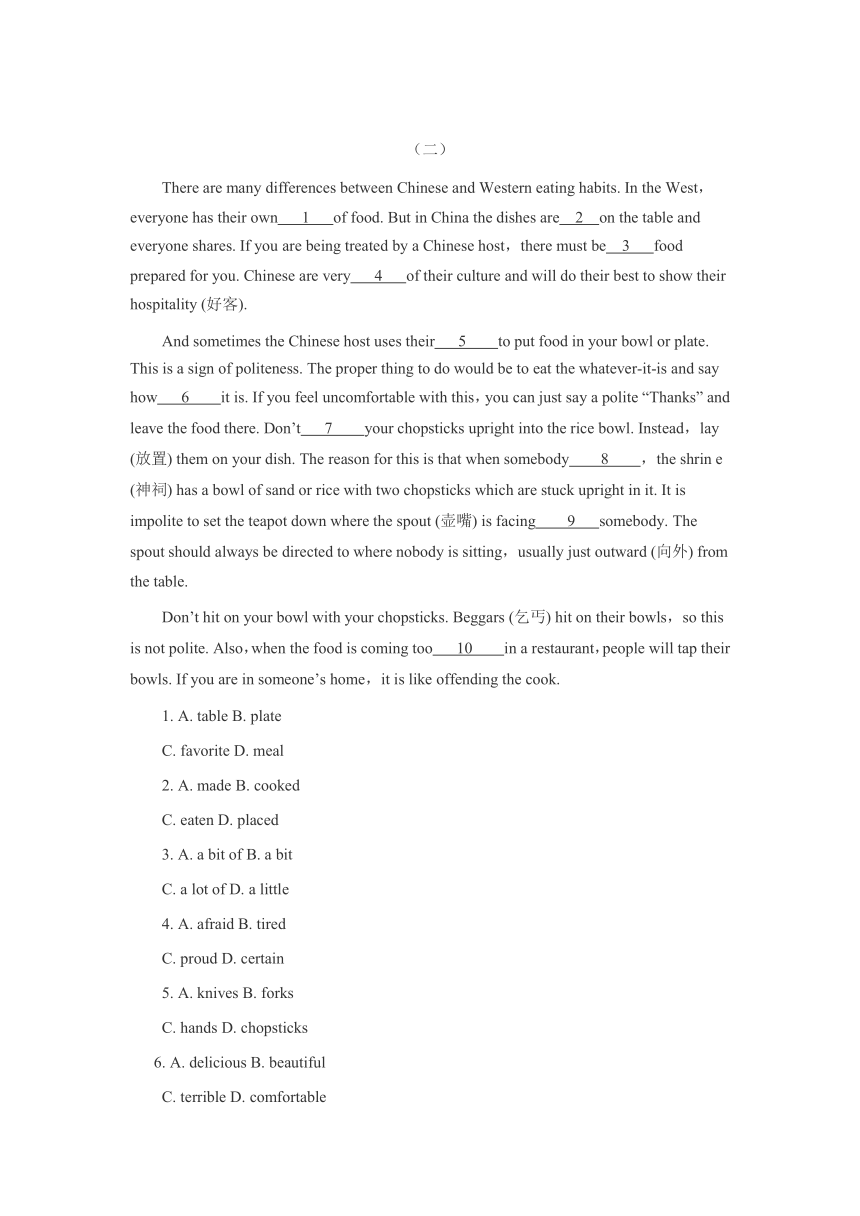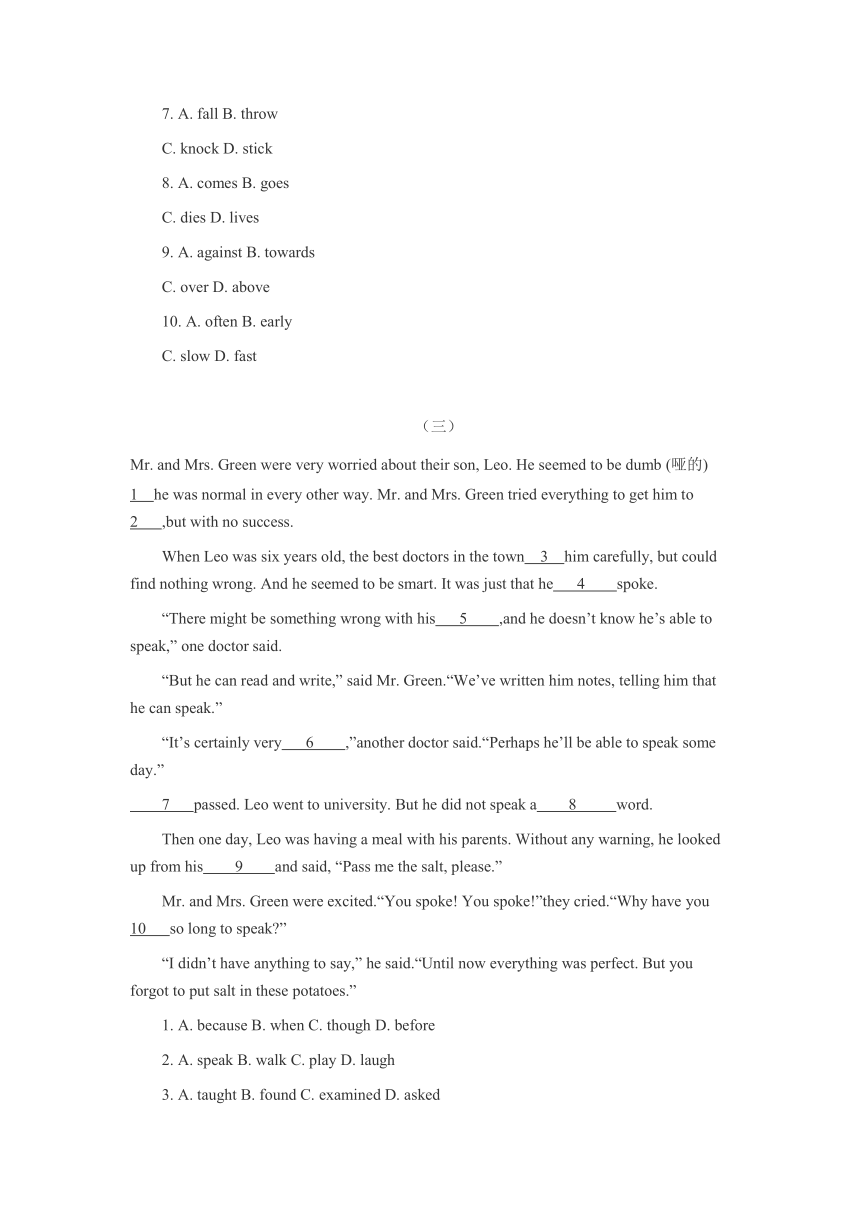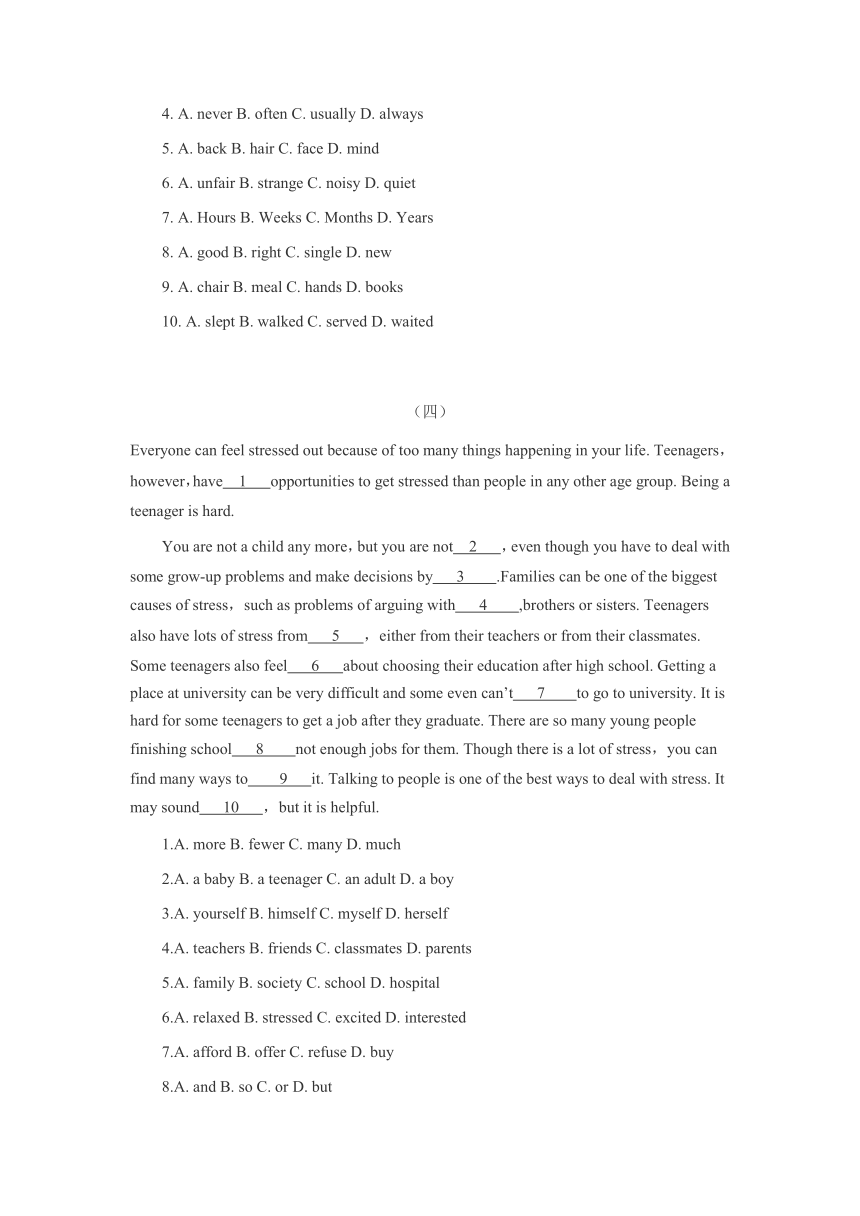2022年中考英语复习专题训练-完形填空专练题(5篇含答案及部分解析)
文档属性
| 名称 | 2022年中考英语复习专题训练-完形填空专练题(5篇含答案及部分解析) |  | |
| 格式 | doc | ||
| 文件大小 | 66.0KB | ||
| 资源类型 | 教案 | ||
| 版本资源 | 人教新目标(Go for it)版 | ||
| 科目 | 英语 | ||
| 更新时间 | 2021-12-23 20:52:44 | ||
图片预览




文档简介
完形填空专练题(含答案解析) 2022年中考英语复习专题训练
阅读下面短文,掌握其大意,然后从每小题所给的A、B、C、D四个选项中,选出一个最佳选项。
(一)
Bessie is a ___1___ girl. She is only five years ___2____. She ____3____ go to school, and of course she doesn’t know __4___ to read and write. ____5___ her sister, Mary, is a schoolgirl. She is ten.
One day, Mary saw her little sister ____6___ the table with a pen in her hand and ___7___ in front of her.
“What are you ___8___, Bessie ” she said.
“ I’m writing a letter ___9___ my friend Kitty,” said Bessie.
“But how can you ” said her sister. “ You __10___ how to write.”
“Well,” said Bessie, “it doesn’t matter. Because Kitty doesn’t know how to read.”
( )1. A. young B. little C. good D. tall
( )2. A. old B. young C. long D. short
( )3. A. isn’t B. is C. does D. doesn’t
( )4. A. why B. which C. where D. how
( )5. A. And B. But C. So D. Then
( )6. A. on B. in C. at D. for
( )7. A. a paper B. a big piece paper
C. big piece papers D. a big piece of paper
( )8. A. do B. does C. doing D. can do
( )9. A. for B. to C. with D. at
( )10. A. don’t know B. aren’t know
C. can’t know D. may not know
(二)
There are many differences between Chinese and Western eating habits. In the West,everyone has their own 1 of food. But in China the dishes are 2 on the table and everyone shares. If you are being treated by a Chinese host,there must be 3 food prepared for you. Chinese are very 4 of their culture and will do their best to show their hospitality (好客).
And sometimes the Chinese host uses their 5 to put food in your bowl or plate. This is a sign of politeness. The proper thing to do would be to eat the whatever-it-is and say how 6 it is. If you feel uncomfortable with this,you can just say a polite “Thanks” and leave the food there. Don’t 7 your chopsticks upright into the rice bowl. Instead,lay (放置) them on your dish. The reason for this is that when somebody 8 ,the shrin e (神祠) has a bowl of sand or rice with two chopsticks which are stuck upright in it. It is impolite to set the teapot down where the spout (壶嘴) is facing 9 somebody. The spout should always be directed to where nobody is sitting,usually just outward (向外) from the table.
Don’t hit on your bowl with your chopsticks. Beggars (乞丐) hit on their bowls,so this is not polite. Also,when the food is coming too 10 in a restaurant,people will tap their bowls. If you are in someone’s home,it is like offending the cook.
1. A. table B. plate
C. favorite D. meal
2. A. made B. cooked
C. eaten D. placed
3. A. a bit of B. a bit
C. a lot of D. a little
4. A. afraid B. tired
C. proud D. certain
5. A. knives B. forks
C. hands D. chopsticks
6. A. delicious B. beautiful
C. terrible D. comfortable
7. A. fall B. throw
C. knock D. stick
8. A. comes B. goes
C. dies D. lives
9. A. against B. towards
C. over D. above
10. A. often B. early
C. slow D. fast
(三)
Mr. and Mrs. Green were very worried about their son, Leo. He seemed to be dumb (哑的) 1 he was normal in every other way. Mr. and Mrs. Green tried everything to get him to 2 ,but with no success.
When Leo was six years old, the best doctors in the town 3 him carefully, but could find nothing wrong. And he seemed to be smart. It was just that he 4 spoke.
“There might be something wrong with his 5 ,and he doesn’t know he’s able to speak,” one doctor said.
“But he can read and write,” said Mr. Green.“We’ve written him notes, telling him that he can speak.”
“It’s certainly very 6 ,”another doctor said.“Perhaps he’ll be able to speak some day.”
7 passed. Leo went to university. But he did not speak a 8 word.
Then one day, Leo was having a meal with his parents. Without any warning, he looked up from his 9 and said, “Pass me the salt, please.”
Mr. and Mrs. Green were excited.“You spoke! You spoke!”they cried.“Why have you 10 so long to speak ”
“I didn’t have anything to say,” he said.“Until now everything was perfect. But you forgot to put salt in these potatoes.”
1. A. because B. when C. though D. before
2. A. speak B. walk C. play D. laugh
3. A. taught B. found C. examined D. asked
4. A. never B. often C. usually D. always
5. A. back B. hair C. face D. mind
6. A. unfair B. strange C. noisy D. quiet
7. A. Hours B. Weeks C. Months D. Years
8. A. good B. right C. single D. new
9. A. chair B. meal C. hands D. books
10. A. slept B. walked C. served D. waited
(四)
Everyone can feel stressed out because of too many things happening in your life. Teenagers,however,have 1 opportunities to get stressed than people in any other age group. Being a teenager is hard.
You are not a child any more,but you are not 2 ,even though you have to deal with some grow-up problems and make decisions by 3 .Families can be one of the biggest causes of stress,such as problems of arguing with 4 ,brothers or sisters. Teenagers also have lots of stress from 5 ,either from their teachers or from their classmates. Some teenagers also feel 6 about choosing their education after high school. Getting a place at university can be very difficult and some even can’t 7 to go to university. It is hard for some teenagers to get a job after they graduate. There are so many young people finishing school 8 not enough jobs for them. Though there is a lot of stress,you can find many ways to 9 it. Talking to people is one of the best ways to deal with stress. It may sound 10 ,but it is helpful.
1.A. more B. fewer C. many D. much
2.A. a baby B. a teenager C. an adult D. a boy
3.A. yourself B. himself C. myself D. herself
4.A. teachers B. friends C. classmates D. parents
5.A. family B. society C. school D. hospital
6.A. relaxed B. stressed C. excited D. interested
7.A. afford B. offer C. refuse D. buy
8.A. and B. so C. or D. but
9.A. agree with B. talk with C. deal with D. chat with
10.A. simple B. difficult C. good D. bad
(五)
The umbrella is a very common object. It keeps the 1 and the sun off the people. Most umbrellas can be folded up(折叠)so it is 2 to carry them.
However, the umbrella was not always as 3 as it is now. In the past, it was a symbol of importance. Some African countries still use umbrellas in this 4 . Someone carries an umbrella and walks behind the king or important person.
Umbrellas have a long history. People in different parts of the world began to 5 umbrellas at different times. The Chinese had them more than 3,000 years ago. From there,umbrellas 6 to India and Egypt. In Greece and Rome, 7 wouldn’t use them. They believed umbrellas were only for women.
England was 8 the first country in Europe where common people used umbrellas against rain. The weather there is very 9 and umbrellas are very useful.
Everybody uses umbrellas today. The next time you 10 one, thinking that for centuries only great men and women used them, you’ll feel you are the important person, too.
1. A. rain B. cloud C. air D. water
2. A. lovely B. cheap C. hard D. easy
3. A. light B. heavy C. common D. special
4. A. way B. size C. reason D. place
5. A. discover B. use C. examine D. discuss
6. A. walked B. travelled C. rode D. flew
7. A. children B. parents C. men D. women
8. A. probably B. already C. suddenly D. immediately
9. A. sunny B. rainy C. snowy D. windy
10. A. sell B. return C. borrow D. carry
【参考答案及解析】
(一)1. B 2. A 3. D 4. D 5. B 6.C 7. D 8. C 9.B 10.A
(二)1.B 在西方,每个人都有自己盛食物的盘子。
2.D 在中国,饭菜被放在桌子上,大家共享。
3.C 由常识可知,在中国做客,主人会为你准备许多食物。
4.C 中国人以自己的文化为骄傲。be proud of...“为……感到自豪(骄傲)”。
5.D 根据中国的饮食习惯,主人会用“筷子”把食物放进你的碗或盘子里。
6.A 对主人说食物多么好吃。
7.D 不要把筷子直接插进盛米饭的碗里。
8.C 当有人去世时,把两支筷子插在盛有沙子或稻米的碗中。
9.B towards sb.“朝向某人”。
10.C 饭店里上菜太慢的时候,人们会敲碗。
(三)1.C 由前句句意“他看起来好像是哑的”和后句句意“他在其他各个方面都正常”可知,选C。though意为“尽管”,在此处引导让步状语从句。
2.A 结合上文可知,此处句意应为“格林夫妇想尽一切办法让他说话,但是没有成功”。speak“说话”;walk“行走,散步”;play“玩,打(球)”;laugh“笑”,故选A。
3.C teach“教”;find“发现”;examine“检查”;ask“问”。结合句中的doctors(医生)可知本句句意应为“当Leo六岁的时候,镇上最好的医生对他进行了仔细检查……”。故选C。
4.A 结合上文Leo一直未说话可知,此处句意应为“只是他从未说话”。never“从不”;often“经常”;usually“通常”;always“一直”。故选A。
5.D 由下文的“他不知道他会说话”可知,此处句意应为“他的大脑可能有问题……”。back“后背”;hair“头发”;face“脸”;mind“大脑”。故选D。
6.B 由上文格林先生的话“但是他会读和写,” “我们给他写过便条,告诉他他会说话”可知,此处句意应为“这当然很奇怪……”。unfair“不公平的”;strange“奇怪的”;noisy“嘈杂的”;quiet“安静的”。故选B。
7.D 由下文“Leo上了大学”可知此处句意应为“几年过去了”。故选D。
8.C good“好的”;right“正确的”;single“单个的”;new“新的”。结合英语提示可知此处句意应为“但他从未说过一个字”。故选C。
9.B 由上文“Then one day, Leo was having a meal with his parents.”可知此处句意应为“没有任何预兆,他的目光从饭上移开抬起头说……”,故选B。
10.D 由李奥多年未说话可知格林夫妇此时的疑问是“为什么你等了这么长时间才说话 ” sleep“睡觉”;walk“行走,散步”;serve“服务”;wait“等待”。故选D。
(四) 1.A 由than可知是比较级结构的句子,由语境可推知句意为“然而,青少年的压力比任何其他年龄段的人都要多”。fewer意为“更少的”,与题意不符。故选A。
2.C but表示转折,根据上文“你不再是孩子”可知,此处意为“但你也不是成年人”。故选C。
3.A 主语是you,因此用by yourself。句意:你不再是孩子,但你也不是成年人,即使你不得不处理一些成长问题并自己做决定。
4.D 由such as可知是对上文内容进行补充说明,关键词是families,因此应填parents。句意:家庭可能是压力的最大的原因之一,比如和父母、兄弟、姐妹的争吵问题。故选D。
5.C 由下文...either from their teachers or from their classmates.可知与学校相关,故选C。
6.B 联系上文及also可知,青少年高中毕业后在选择教育上,也感到有压力。
7.A 由句意“考上大学可能是非常困难的,有些学生甚至负担不起上大学”可知应选A。
8.D “有如此多的年轻人毕业”与“没有足够的工作给他们”之间是转折关系,因此用but。
9.C agree with“同意”;talk with“与……交谈”;deal with “处理”;chat with“与……聊天”。由“虽然有许多压力”可推知,此处是指“但是你能找到许多处理的方法”。故选C。
10.A 由上下文可知句意为“这听起来可能简单,但对缓解压力很有帮助”。故选A。
(五)
1.A
2.D lovely“可爱的”;cheap“便宜的”;hard“困难的”;easy“简单的”,由前面的“大多数雨伞能被折叠起来”可知“因此它们容易携带”。故选D。
3.C light“轻的”;heavy“重的”;common“普遍的”;special“特殊的”,由下文的“在过去,它是重要性的象征”可知此句句意为:然而,雨伞过去并不总是像现在一样普遍。故选C。
4.A in this way“这样,以这种方式”,是固定短语。
5.B
6.B walk“走;步行”;travel“传送”;ride“骑”;fly“飞”。句意:雨伞从那里传到了印度和埃及。
7.C 由后句句意“他们认为雨伞只适合妇女”可知此句句意为:在希腊和罗马,男人不使用雨伞。故选C。
8.A
9.B
10.D
阅读下面短文,掌握其大意,然后从每小题所给的A、B、C、D四个选项中,选出一个最佳选项。
(一)
Bessie is a ___1___ girl. She is only five years ___2____. She ____3____ go to school, and of course she doesn’t know __4___ to read and write. ____5___ her sister, Mary, is a schoolgirl. She is ten.
One day, Mary saw her little sister ____6___ the table with a pen in her hand and ___7___ in front of her.
“What are you ___8___, Bessie ” she said.
“ I’m writing a letter ___9___ my friend Kitty,” said Bessie.
“But how can you ” said her sister. “ You __10___ how to write.”
“Well,” said Bessie, “it doesn’t matter. Because Kitty doesn’t know how to read.”
( )1. A. young B. little C. good D. tall
( )2. A. old B. young C. long D. short
( )3. A. isn’t B. is C. does D. doesn’t
( )4. A. why B. which C. where D. how
( )5. A. And B. But C. So D. Then
( )6. A. on B. in C. at D. for
( )7. A. a paper B. a big piece paper
C. big piece papers D. a big piece of paper
( )8. A. do B. does C. doing D. can do
( )9. A. for B. to C. with D. at
( )10. A. don’t know B. aren’t know
C. can’t know D. may not know
(二)
There are many differences between Chinese and Western eating habits. In the West,everyone has their own 1 of food. But in China the dishes are 2 on the table and everyone shares. If you are being treated by a Chinese host,there must be 3 food prepared for you. Chinese are very 4 of their culture and will do their best to show their hospitality (好客).
And sometimes the Chinese host uses their 5 to put food in your bowl or plate. This is a sign of politeness. The proper thing to do would be to eat the whatever-it-is and say how 6 it is. If you feel uncomfortable with this,you can just say a polite “Thanks” and leave the food there. Don’t 7 your chopsticks upright into the rice bowl. Instead,lay (放置) them on your dish. The reason for this is that when somebody 8 ,the shrin e (神祠) has a bowl of sand or rice with two chopsticks which are stuck upright in it. It is impolite to set the teapot down where the spout (壶嘴) is facing 9 somebody. The spout should always be directed to where nobody is sitting,usually just outward (向外) from the table.
Don’t hit on your bowl with your chopsticks. Beggars (乞丐) hit on their bowls,so this is not polite. Also,when the food is coming too 10 in a restaurant,people will tap their bowls. If you are in someone’s home,it is like offending the cook.
1. A. table B. plate
C. favorite D. meal
2. A. made B. cooked
C. eaten D. placed
3. A. a bit of B. a bit
C. a lot of D. a little
4. A. afraid B. tired
C. proud D. certain
5. A. knives B. forks
C. hands D. chopsticks
6. A. delicious B. beautiful
C. terrible D. comfortable
7. A. fall B. throw
C. knock D. stick
8. A. comes B. goes
C. dies D. lives
9. A. against B. towards
C. over D. above
10. A. often B. early
C. slow D. fast
(三)
Mr. and Mrs. Green were very worried about their son, Leo. He seemed to be dumb (哑的) 1 he was normal in every other way. Mr. and Mrs. Green tried everything to get him to 2 ,but with no success.
When Leo was six years old, the best doctors in the town 3 him carefully, but could find nothing wrong. And he seemed to be smart. It was just that he 4 spoke.
“There might be something wrong with his 5 ,and he doesn’t know he’s able to speak,” one doctor said.
“But he can read and write,” said Mr. Green.“We’ve written him notes, telling him that he can speak.”
“It’s certainly very 6 ,”another doctor said.“Perhaps he’ll be able to speak some day.”
7 passed. Leo went to university. But he did not speak a 8 word.
Then one day, Leo was having a meal with his parents. Without any warning, he looked up from his 9 and said, “Pass me the salt, please.”
Mr. and Mrs. Green were excited.“You spoke! You spoke!”they cried.“Why have you 10 so long to speak ”
“I didn’t have anything to say,” he said.“Until now everything was perfect. But you forgot to put salt in these potatoes.”
1. A. because B. when C. though D. before
2. A. speak B. walk C. play D. laugh
3. A. taught B. found C. examined D. asked
4. A. never B. often C. usually D. always
5. A. back B. hair C. face D. mind
6. A. unfair B. strange C. noisy D. quiet
7. A. Hours B. Weeks C. Months D. Years
8. A. good B. right C. single D. new
9. A. chair B. meal C. hands D. books
10. A. slept B. walked C. served D. waited
(四)
Everyone can feel stressed out because of too many things happening in your life. Teenagers,however,have 1 opportunities to get stressed than people in any other age group. Being a teenager is hard.
You are not a child any more,but you are not 2 ,even though you have to deal with some grow-up problems and make decisions by 3 .Families can be one of the biggest causes of stress,such as problems of arguing with 4 ,brothers or sisters. Teenagers also have lots of stress from 5 ,either from their teachers or from their classmates. Some teenagers also feel 6 about choosing their education after high school. Getting a place at university can be very difficult and some even can’t 7 to go to university. It is hard for some teenagers to get a job after they graduate. There are so many young people finishing school 8 not enough jobs for them. Though there is a lot of stress,you can find many ways to 9 it. Talking to people is one of the best ways to deal with stress. It may sound 10 ,but it is helpful.
1.A. more B. fewer C. many D. much
2.A. a baby B. a teenager C. an adult D. a boy
3.A. yourself B. himself C. myself D. herself
4.A. teachers B. friends C. classmates D. parents
5.A. family B. society C. school D. hospital
6.A. relaxed B. stressed C. excited D. interested
7.A. afford B. offer C. refuse D. buy
8.A. and B. so C. or D. but
9.A. agree with B. talk with C. deal with D. chat with
10.A. simple B. difficult C. good D. bad
(五)
The umbrella is a very common object. It keeps the 1 and the sun off the people. Most umbrellas can be folded up(折叠)so it is 2 to carry them.
However, the umbrella was not always as 3 as it is now. In the past, it was a symbol of importance. Some African countries still use umbrellas in this 4 . Someone carries an umbrella and walks behind the king or important person.
Umbrellas have a long history. People in different parts of the world began to 5 umbrellas at different times. The Chinese had them more than 3,000 years ago. From there,umbrellas 6 to India and Egypt. In Greece and Rome, 7 wouldn’t use them. They believed umbrellas were only for women.
England was 8 the first country in Europe where common people used umbrellas against rain. The weather there is very 9 and umbrellas are very useful.
Everybody uses umbrellas today. The next time you 10 one, thinking that for centuries only great men and women used them, you’ll feel you are the important person, too.
1. A. rain B. cloud C. air D. water
2. A. lovely B. cheap C. hard D. easy
3. A. light B. heavy C. common D. special
4. A. way B. size C. reason D. place
5. A. discover B. use C. examine D. discuss
6. A. walked B. travelled C. rode D. flew
7. A. children B. parents C. men D. women
8. A. probably B. already C. suddenly D. immediately
9. A. sunny B. rainy C. snowy D. windy
10. A. sell B. return C. borrow D. carry
【参考答案及解析】
(一)1. B 2. A 3. D 4. D 5. B 6.C 7. D 8. C 9.B 10.A
(二)1.B 在西方,每个人都有自己盛食物的盘子。
2.D 在中国,饭菜被放在桌子上,大家共享。
3.C 由常识可知,在中国做客,主人会为你准备许多食物。
4.C 中国人以自己的文化为骄傲。be proud of...“为……感到自豪(骄傲)”。
5.D 根据中国的饮食习惯,主人会用“筷子”把食物放进你的碗或盘子里。
6.A 对主人说食物多么好吃。
7.D 不要把筷子直接插进盛米饭的碗里。
8.C 当有人去世时,把两支筷子插在盛有沙子或稻米的碗中。
9.B towards sb.“朝向某人”。
10.C 饭店里上菜太慢的时候,人们会敲碗。
(三)1.C 由前句句意“他看起来好像是哑的”和后句句意“他在其他各个方面都正常”可知,选C。though意为“尽管”,在此处引导让步状语从句。
2.A 结合上文可知,此处句意应为“格林夫妇想尽一切办法让他说话,但是没有成功”。speak“说话”;walk“行走,散步”;play“玩,打(球)”;laugh“笑”,故选A。
3.C teach“教”;find“发现”;examine“检查”;ask“问”。结合句中的doctors(医生)可知本句句意应为“当Leo六岁的时候,镇上最好的医生对他进行了仔细检查……”。故选C。
4.A 结合上文Leo一直未说话可知,此处句意应为“只是他从未说话”。never“从不”;often“经常”;usually“通常”;always“一直”。故选A。
5.D 由下文的“他不知道他会说话”可知,此处句意应为“他的大脑可能有问题……”。back“后背”;hair“头发”;face“脸”;mind“大脑”。故选D。
6.B 由上文格林先生的话“但是他会读和写,” “我们给他写过便条,告诉他他会说话”可知,此处句意应为“这当然很奇怪……”。unfair“不公平的”;strange“奇怪的”;noisy“嘈杂的”;quiet“安静的”。故选B。
7.D 由下文“Leo上了大学”可知此处句意应为“几年过去了”。故选D。
8.C good“好的”;right“正确的”;single“单个的”;new“新的”。结合英语提示可知此处句意应为“但他从未说过一个字”。故选C。
9.B 由上文“Then one day, Leo was having a meal with his parents.”可知此处句意应为“没有任何预兆,他的目光从饭上移开抬起头说……”,故选B。
10.D 由李奥多年未说话可知格林夫妇此时的疑问是“为什么你等了这么长时间才说话 ” sleep“睡觉”;walk“行走,散步”;serve“服务”;wait“等待”。故选D。
(四) 1.A 由than可知是比较级结构的句子,由语境可推知句意为“然而,青少年的压力比任何其他年龄段的人都要多”。fewer意为“更少的”,与题意不符。故选A。
2.C but表示转折,根据上文“你不再是孩子”可知,此处意为“但你也不是成年人”。故选C。
3.A 主语是you,因此用by yourself。句意:你不再是孩子,但你也不是成年人,即使你不得不处理一些成长问题并自己做决定。
4.D 由such as可知是对上文内容进行补充说明,关键词是families,因此应填parents。句意:家庭可能是压力的最大的原因之一,比如和父母、兄弟、姐妹的争吵问题。故选D。
5.C 由下文...either from their teachers or from their classmates.可知与学校相关,故选C。
6.B 联系上文及also可知,青少年高中毕业后在选择教育上,也感到有压力。
7.A 由句意“考上大学可能是非常困难的,有些学生甚至负担不起上大学”可知应选A。
8.D “有如此多的年轻人毕业”与“没有足够的工作给他们”之间是转折关系,因此用but。
9.C agree with“同意”;talk with“与……交谈”;deal with “处理”;chat with“与……聊天”。由“虽然有许多压力”可推知,此处是指“但是你能找到许多处理的方法”。故选C。
10.A 由上下文可知句意为“这听起来可能简单,但对缓解压力很有帮助”。故选A。
(五)
1.A
2.D lovely“可爱的”;cheap“便宜的”;hard“困难的”;easy“简单的”,由前面的“大多数雨伞能被折叠起来”可知“因此它们容易携带”。故选D。
3.C light“轻的”;heavy“重的”;common“普遍的”;special“特殊的”,由下文的“在过去,它是重要性的象征”可知此句句意为:然而,雨伞过去并不总是像现在一样普遍。故选C。
4.A in this way“这样,以这种方式”,是固定短语。
5.B
6.B walk“走;步行”;travel“传送”;ride“骑”;fly“飞”。句意:雨伞从那里传到了印度和埃及。
7.C 由后句句意“他们认为雨伞只适合妇女”可知此句句意为:在希腊和罗马,男人不使用雨伞。故选C。
8.A
9.B
10.D
同课章节目录
- 词法
- 名词
- 动词和动词短语
- 动词语态
- 动词时态
- 助动词和情态动词
- 非谓语动词
- 冠词
- 代词
- 数词和量词
- 形容词副词及其比较等级
- 介词和介词短语
- 连词和感叹词
- 构词法
- 相似、相近词比较
- 句法
- 陈述句
- 一般疑问句和否定疑问句
- 特殊疑问句及选择疑问句
- 反意疑问句
- 存在句(There be句型)
- 宾语从句
- 定语从句
- 状语从句
- 主谓一致问题
- 简单句
- 并列句
- 复合句
- 主谓一致
- 主、表语从句
- 名词性从句
- 直接引语和间接引语
- 虚拟语气
- 感叹句
- 强调句
- 倒装句
- 祈使句
- 句子的成分
- 句子的分类
- 题型专区
- 单项选择部分
- 易错题
- 完形填空
- 阅读理解
- 词汇练习
- 听说训练
- 句型转换
- 补全对话
- 短文改错
- 翻译
- 书面表达
- 任务型阅读
- 语法填空
- 其他资料
